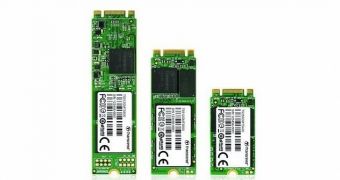Another day, another disappointment. Although we suppose that we probably shouldn't call SATA-based M.2 SSDs disappointments when there's only one such drive designed for the PCI Express root complex.
Still, it was bound to happen. After all, the first M.2 solid-state drive in the world, or one of them, was made for M.2 slots based on PCI Express, which means that the top performance was colossal.
To be more precise, the M.2 SSD can reach 1.8 GB/s. And yet, that's gigabyte, not gigabit. A truly massive throughput, if we do say so ourselves. Which we just did.
Unfortunately, most motherboards featuring M.2 slots have them wired through the SATA III interface, otherwise known as SATA 6.0 Gbps.
Similarly, most M.2 SSDs released by storage makers so far also have controller chips that can work on the SATA interface, rather than PCI Express x2/x4.
Ultimately, that means that the new drives, though as small and thin as two fingers (much smaller than 2.5-inch units), are, nonetheless, no faster than their regular siblings.
This extends to the Transcend MTS400/600/800 M.2 SSDs that just came out, and which come in type 2242, 2260 and 2280 M.2 form factors.
Yes, apparently, there's more than one M.2 form factor. The slot/connector is always the same, but even these things can be longer and/or wider than their kin.
Transcend made the newcomers for portable devices, like laptops and professional tablets (media slates still use embedded flash, for the most part).
Well, Transcend says in its press release that the new MTS M.2 are supposed to work for portable gaming systems and smartphones too, but we'll not be holding our breath for that last one.
The top capacity is of 512 GB (quite impressive for a form factor so more physically compact than 2.5-inch) and can attain transfer speeds of 560 MB/s read, 310 MB/s write. Transcend used its own controller for this, TS6500, as well as DRAM cache memory.
All newcomers have Device Sleep Mode (DevSleep, allows mobile devices to totally depower the SATA slot) and Intel Smart Response Technology (ISRT, allows the SSD to be seen as part of the same device as an HDD of your choice).
The Transcend MTS 400/600/800 M.2 SSDs, with capacities of 32 GB to 512 GB, should already be selling for $39 / €39 to $319 / €319 (exchange rates don't matter here, as usual). All are backed by 3-year warranties.

 14 DAY TRIAL //
14 DAY TRIAL //